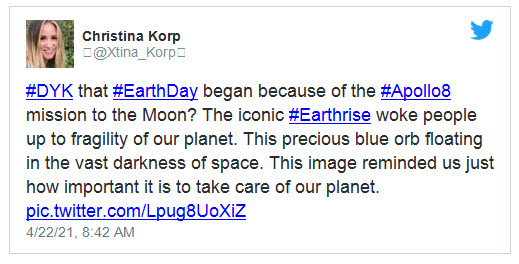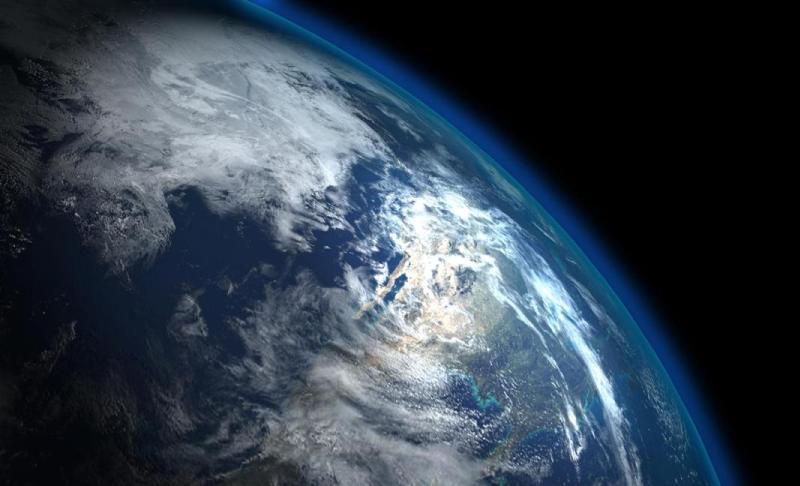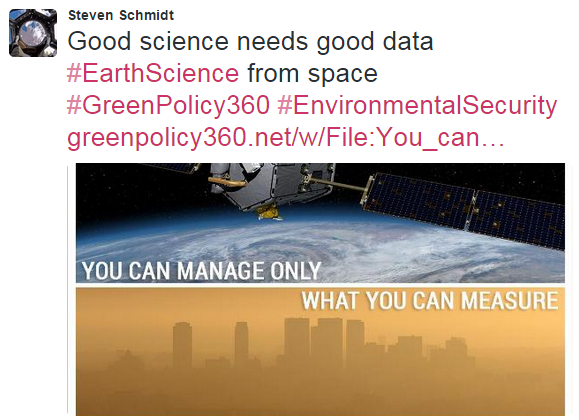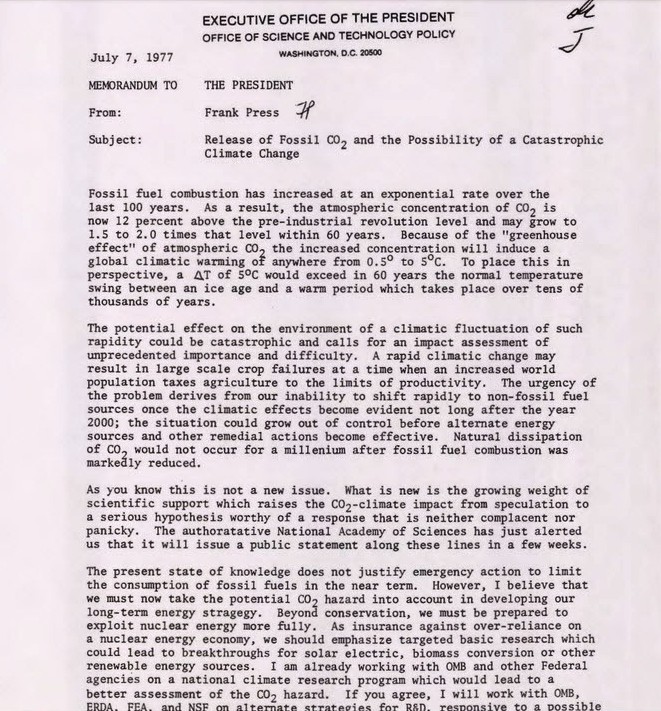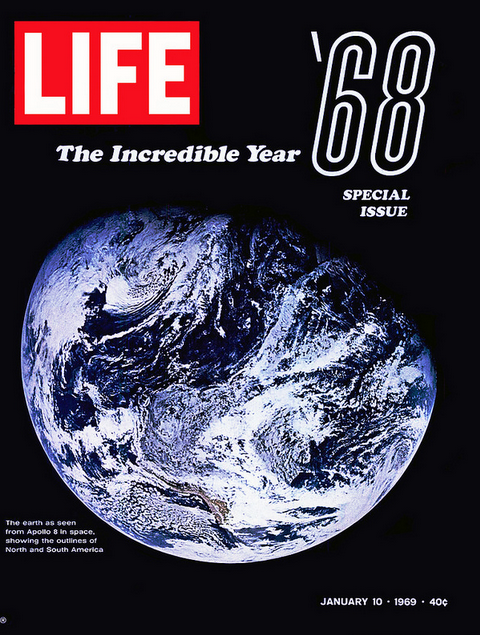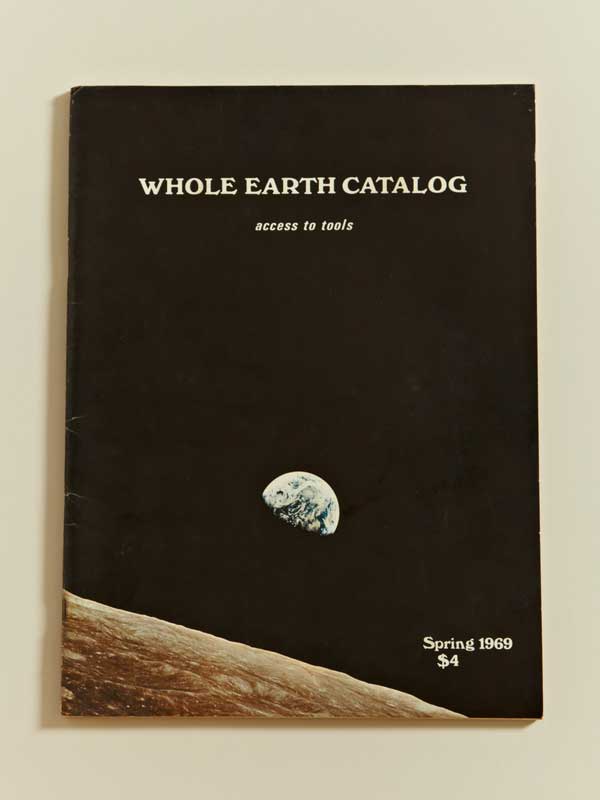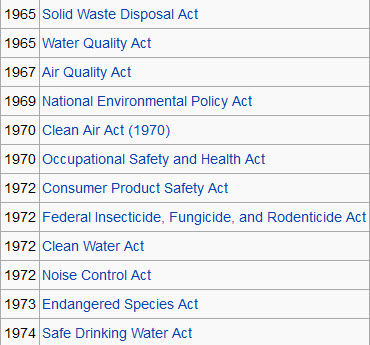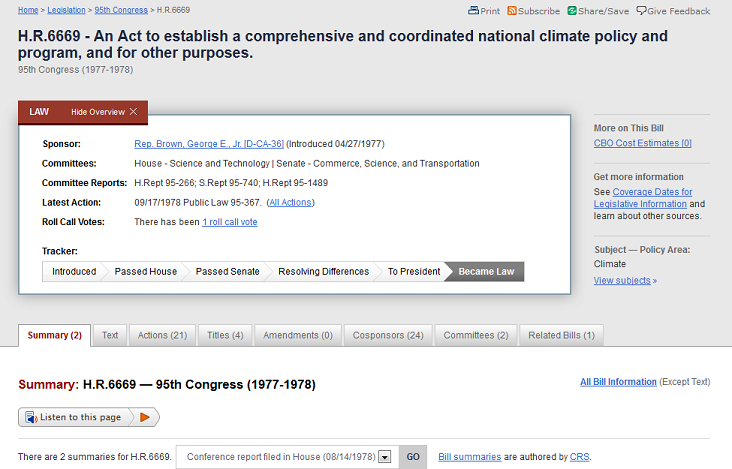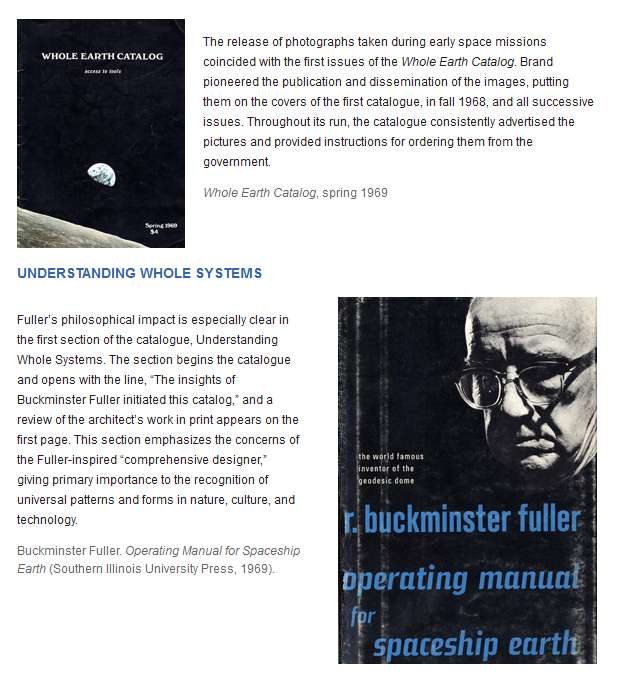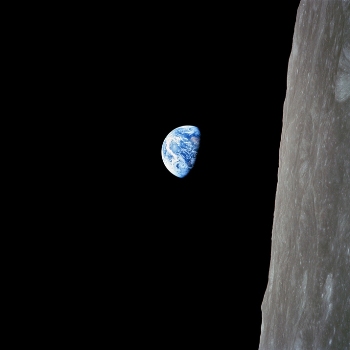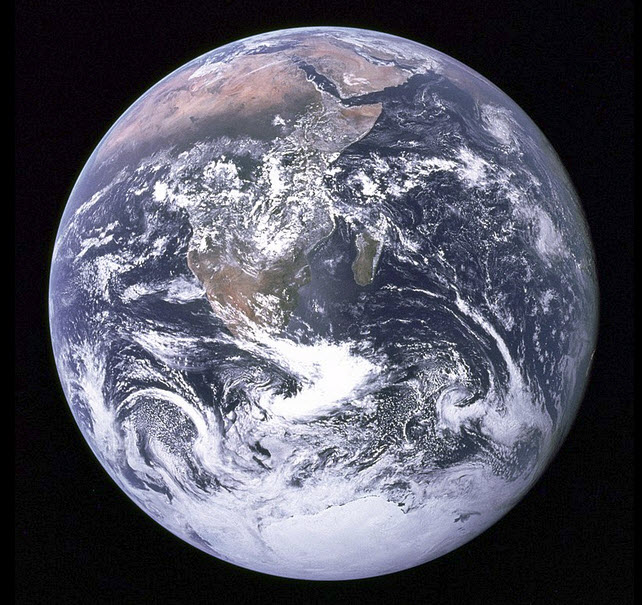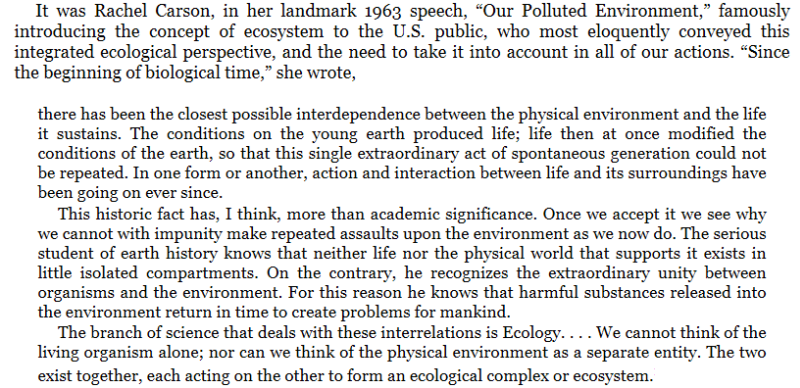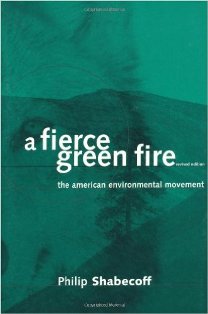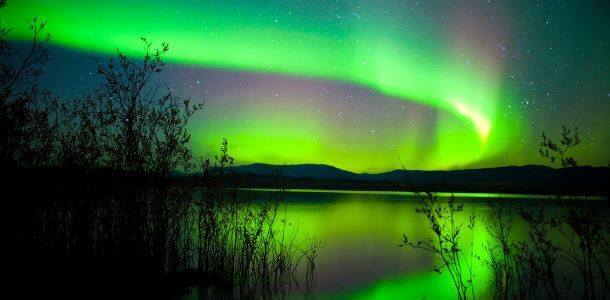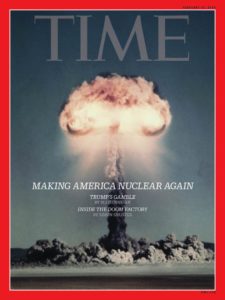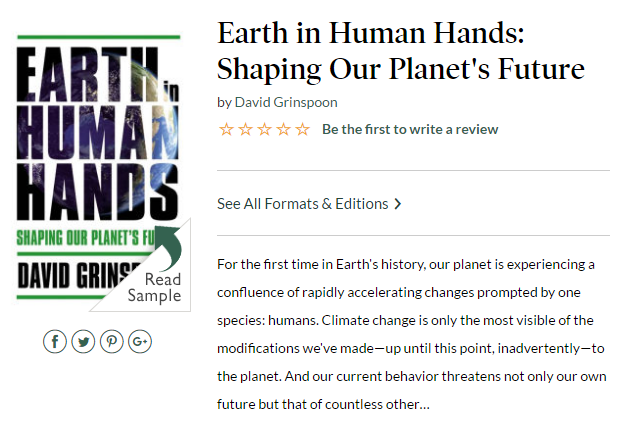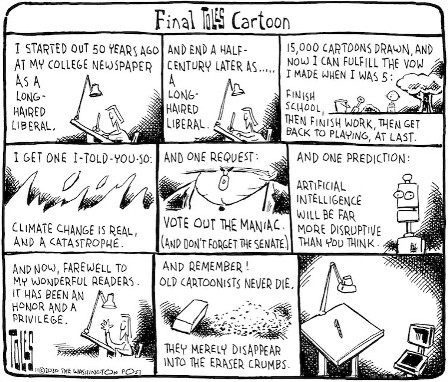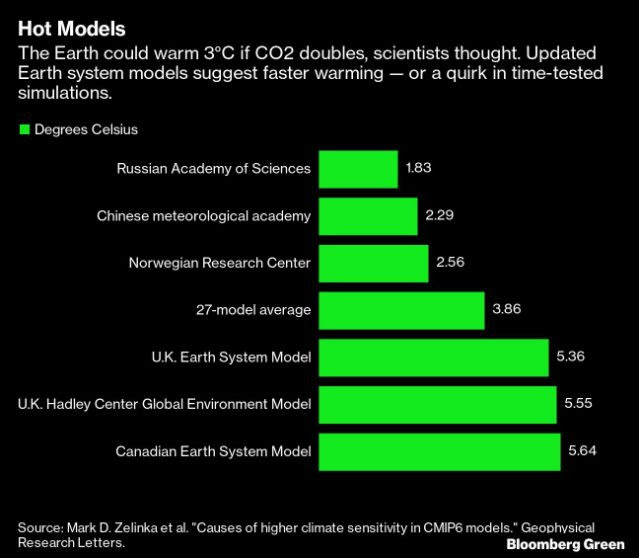Environmental movement
🌎 Beginnings of the Modern Environmental Movement
SJS / Siterunner: Against a backdrop of conflict, the 1960s gave rise to a burgeoning movement. Civil rights, free speech, anti-war and anti-nuclear weapons and catastrophe came to light. Across the world many young people and activists were moved to work for peace, nuclear weapons reduction, and social justice. In the U.S. the civil rights movement and nationwide civil rights action challenged racist politics. Environmentalism took on new forms and shapes with ideas that became a legal platform, a first generation of environmental laws that would go worldwide. A new "counterculture" with youthful vision and organizing added their voices and stood up to create the beginnings of a global environmental movement.
With a goal of protecting life, a new environmental movement began to grow, a "Whole Earth" vision seen for the first time from space in 1968 with the iconic Apollo 8 Earthrise image and a very real 'sense' of our common responsibility for the future of the planet. Students were 'first-movers' who spoke of the existential threat of nuclear war and environmental disaster, and need to 'become' far-reaching with a new vision. Realizations grew internationally that we had created weapons capable of ending humanity and most all life of earth -- and we needed to change this nuclear doomsday threat. Protests and 'teach ins', led by students, and drawing in politicians, communities, media, news with pamphlets, books, music, art and demonstrations crossed continents with new symbols, peace symbols, environmental and eco-awareness.
The threads of teach-ins led directly to and the first Earth Day in 1970 as students expanded counterculture with action. Across the U.S., a first Earth Day of teach-ins began as a student-initiated movement on college campuses including your siterunner's college where we proposed an environment and peace action day to Senator Nelson, who we met as we organized the national Moratorium and who worked with us to make an Earth Day a national political event. At the University of Southern California, our student peace activists continued 1969's anti-war moratorium sharing a positive vision of what was needed -- environmental protection, economic and social justice, new priorities added to the nation's agenda. The work spread quickly. Earth Day's teach-ins reached out to students globally. A worldwide environmental movement became a real and growing political force...
"I am convinced that the same concern the youth of this nation took in changing this nation's priorities on the war in Vietnam and on civil rights can be shown for the problems of the environment. Successful teach-ins on all campuses on the same day will have a dramatic impact on the environmental conscience of the nation. They will be immensely effective as an educational effort in arousing public opinion..."
- -- Senator Nelson, April 23, 1970 at the University of Southern California
- Earth Day flag
SJS / Siterunner: Inviting Senator Gaylord Nelson to USC as we organized what became the first Earth Day was an extension of peace work in the 1960s that linked to Apollo missions revealing vision-shifting, first-ever images of Planet Earth. We proposed an Earth Day event (Wikipedia) amid what the Senator called the "rumblings", as many of us in the student movement organized optimistically with our new 'whole Earth' vision. The profound issues of 60s, civil rights and the war in Vietnam led us dealing with what we called "the big picture". This, in turn, led to seeing with new eyes, with planetary awareness. It became a time for looking ahead and alternatives to politics- and business-as-usual. The modern environmental movement sprang forward and, on April 22nd, the first Earth Day raised its flag.
- DYK? Yes, we do, we remember the beginnings !
Atmospheric Science
- Earth Science to Protect & Preserve a Sustainable Earth
- Time to act to make a positive difference
Planet Citizens, Planet Scientists, Preserving & Protecting the Home Planet Earth
GreenPolicy360 Siterunner / SJS: In the 1960s and 1970s, George E. Brown proposed and set in motion a first generation of Earth Science missions and programs that continued lover the decades. The original Mission Statement of a newly launched U.S. space program spoke of our planet and our responsibilities to 'manage' our planet's living, changing systems. George's work was operational in turning the mission to reality.
When one looks at today's Earth Science Research from Space and accumulative science data acquired over the decades, we are seeing the results of George's vision. As an engineer with a physics background, he knew we would need good scientific data to make the decisions guiding how we respond to the great challenges of our times, the existential threats on multiple fronts, and we are tapping into the results of programs designed to produce the knowledge base George Brown knew would be needed to make wise decisions. Whether we make the necessary decisions is up to our generation, every generation has a 'generational responsibility' as we, at GreenPolicy360 see the challenges all of us must face, as Planet Citizens and act wisely and with vision...
GreenPolicy360's founder was fortunate, beginning in the 1960s, to listen to Congressman Brown Congressman George E. Brown point to the NASA plan and explain how he saw Congress put into action the reality of a multi-year, coordinated, multi-agency program to achieve mission goals. Earth science, measuring and monitoring Earth's life-enabling systems was given highest priority. Landsat's program was set in motion as a decades long, first-ever digital scanning remote satellites data collecting study. An array of satellites began to launch, creating and combining the expanding resources of NASA, USGS, NOAA, and an array of educational and scientific institutions and aeronautics business.
The overall goal, Representative Brown would continue to explain in his Congressional Science, Space & Technology leadership roles over the decades, was to understand, preserve and protect our planet as we, humanity, develop the science to look beyond the Earth and study 'the heavens'.
Here's to George Brown and the many visionaries, thinkers and doers who have carried on preserving and protecting our home planet.
As George and I worked with him over many years we both grew in our politics as we worked together for peace and environmental protection. Big science was at the center of much of George's future-looking agenda. He believed in green politics and was a mentor to me and many. He became a leader in Congress from California who helped shape the modern environmental movement.
Today many of the actions of George Brown continue as models for citizens, cities and nations of the world. California and a green political/environmental protection movement that George helped to begin continue to be out in front with ideas to improve quality of life.
In our GreenPolicy360 work, George's work continues. Even as political opposition to environmental work, anti-nuclear work, anti-war work is at risk, as we look out at a strategic horizon with pressing demands, the foundations put in place by an earlier generation remain strong.
Planet Citizens | Planet Citizens, Planet Scientists
George Brown's work remains with us in his legacy of accomplishment. I miss him often but know he is still around. I feel him when I write of green ideas and look to our kids and education and our shared future...
Let's look at some of what George accomplished before his untimely passing in 1999:
George was instrumental in proposing and establishing the Presidential Office of Science and Technology Policy in 1976. He was working alongside the National Academy of Sciences as they released a first-ever climate report in 1977. In 1977 he and the new Office of Science and Technology sent a first government warning of "climatic fluctuation" and "catastrophic" change to President Carter:
GreenPolicy360
- "Greening Our Blue Planet"
On a Green 50th Anniversary
Memories on the Road to the First Earth Day
• https://www.greenpolicy360.net/w/Earth_Day_Memories_on_the_50th_Anniversary
··················································
The U.S. Environmental Protection Agency Looks Back at Origins
http://www2.epa.gov/aboutepa/guardian-origins-epa
"American environmentalism dawned as a popular movement on a mild spring afternoon in 1970. Wednesday, April 22nd, brought blue skies, light breezes, and temperatures in the 60s to New York City and Washington, D.C. Much of the rest of the country enjoyed similar conditions. On that day, the influence of nature had particular meaning; the nation held a celebration of clean air, land, and water. Encouraged by the retreat of winter, millions participated."
"The first Earth Day may have been prompted... by the recent moon landings. When the astronauts turned their cameras homeward in December 1968, capturing first images of a blue planet, the world looked upon itself with awe and new whole-Earth understanding..."
A "Whole Earth" movement was born as citizens of planet Earth looked up and looked back and saw, for the first time, majestic real-time pictures of home.
Years later, the Environmental Protection Agency published its history, including these notable phrases:
"By late 1969, the subterranean rumblings heralding the impending explosion could already be heard... "Suddenly out of the woodwork come thousands of people talking about ecology."
"It was at just this time that Congress sent to the President a remarkable bill known as the National Environmental Policy Act (NEPA). Senator Gaylord Nelson (D-Wis) -- looking back at the "Environmental Decade" in 1980 -- called NEPA "the most important piece of environmental legislation in our history."
Senator Gaylord Nelson recalls that right after the passage of NEPA, "the issue of the environment exploded on the country like Mount St. Helens."
National Environmental Policy Act
···································································
"Planet Citizen / Planet Citizens" 🌎
A Modern Environmental Movement Is Born
File:1969 beginnings of the modern environmental movement.pdf
California and Environmental Politics in the US Congress: Out in Front
SJS / Siterunner: As many of us in the late 1960s on college campuses looked to the future, we began to press politicians to join with us in environmental protection. Young political leaders like California's Jerry Brown and George Brown joined in with the new environmental movement. I personally was fortunate to work with Jerry and George in many ventures, including envisioning and drafting of first green legislation. Jerry was soon to become Governor and earn the moniker of "Governor Moonbeam" for his visionary ideas, and George became a key leader in national science policy, becoming Chair of the science/technology/space committee in the US House of Representatives. Initiatives were put before presidents and Congress and passed due to overwhelming public support. 'Out in front' vision became models (as with many of GreenPolicy's green best practices network models) for cities/states/nations across the globe over the decades. The 1960s/70s/80s formative environmental years are a living legacy. Looking back we continue to see a platform of ideas and vision, a foundation that we are building on ...
- http://www.greenpolicy360.net/mw/images/National_Climate_Program_Act_Public_Law_95-367_Sept_1978.pdf
- ··········································································
"The Magna Carta of the country’s national environmental laws..."
································································
The First Federal Climate Study Plan
(Legislation 1978 drafted/sponsored by George E. Brown (D), East Los Angeles)
○
Green Appreciation for the Vision & Leadership of Two Browns from California -- 'George & Jerry'
California "Out in Front"
○
http://www2.epa.gov/aboutepa/epa-order-11102
http://www2.epa.gov/aboutepa/birth-epa
http://www2.epa.gov/aboutepa/guardian-epas-formative-years-1970-1973
○
Unprecedented environmental protection bills began a process that continues to this day...
Green, environmental public policies, a foundation on which to build sustainable quality of life...
Wikipedia / Environmental Policy of the United States
Water quality act
http://www.encyclopedia.com/article-1G2-3456400109/water-quality-act-1965.html
Air quality act http://scholarship.law.duke.edu/cgi/viewcontent.cgi?article=3197&context=lcp
National environmental policy act http://en.wikipedia.org/wiki/National_Environmental_Policy_Act
Clean air act (extended 1970) https://www.gpo.gov/fdsys/pkg/STATUTE-84/pdf/STATUTE-84-Pg1676.pdf
Occupational safety and health act http://en.wikipedia.org/wiki/Occupational_Safety_and_Health_Act
Consumer product safety act http://en.wikipedia.org/wiki/Consumer_Product_Safety_Act
Federal insecticide, fungicide and rodenticide act http://www.epa.gov/agriculture/lfra.html
Clean water act http://en.wikipedia.org/wiki/Clean_Water_Act
Noise control act http://en.wikipedia.org/wiki/Noise_Control_Act
Endangered species act http://www.fws.gov/endangered/laws-policies/
Safe drinking water act http://water.epa.gov/lawsregs/guidance/sdwa/basicinformation.cfm
·····················································································
Whole Earth
Origins of the modern environmental movement: Earthrise opens our eyes to who we are
Popular culture begins to see the big picture
Buckminister Fuller in 1968, published “Operating Manual for Spaceship Earth.” He called us earth 'astronauts' and we listened and he described how our planet needs continued 'maintenance' in order to keep operating successfully. Earlier, Ray Bradbury in Los Angeles, another creative and visionary 'imagineer' who profoundly influenced students in my generation, had created a new literary term -- Spaceship Earth. We could see the big picture now, a Whole Earth planet flying thru space with us as 'pilots'.
Together, Fuller and Bradbury, influenced Walt Disney (if you can imagine) to create the centerpiece of a new Disneyworld of the future, Epcot, a geodesic story told of Spaceship Earth.
Read the original design script for Spaceship Earth. I was there to report Epcot's unveiling in Florida. -- Your GreenPolicy360 siterunner
File:RAY BRADBURY Spaceship Earth - Epcot - 1977.pdf
Circa 1969 --- We are spaceship Earth...
○ ○ ○ ○ ○ ○ ○ ○ ○ ○ ○
The Apollo 8 Earthrise Photo
http://en.wikipedia.org/wiki/Earthrise
http://www.greenpolicy360.net/w/File:Earthrise_book_cover_%282008%29.jpg
http://www.ibhanet.org/resources/documents/newsletters/spierearthrisephoto.pdf
○
On December 21, 2018, the 50th anniversary of the Apollo 8 launch...
• https://www.greenpolicy360.net/w/File:Apollo.jpg
• http://www.bbc.com/future/story/20181220-the-nasa-mission-that-broadcast-to-a-billion-people
• https://qz.com/1501935/photos-apollo-8-brought-us-the-moon-as-never-seen-before/amp/
• https://petapixel.com/2018/12/20/how-nasas-iconic-earthrise-photo-was-shot/
Today, fifty years on, Bill Anders says that the most striking image to him was not the Earth as seen from the moon, so much as it was the Earth receding in the distance as they left it behind on their outbound voyage. Arguably, that view has changed us — colored our attitude toward the environment, international affairs, our place in the universe—more than Apollo’s other accomplishments.
“It took a while to affect me,” Anders says, “this beautiful blue ball against the darkest black you could imagine, getting smaller and smaller as we went. It made me realize how insignificant our little planet was.”
http://www.greenpolicy360.net/w/File:Apollo_Earth_350x350.jpg
○
1972, a Whole Earth exclamation point, Apollo 17's image of "Blue Marble" Planet Earth
http://www.greenpolicy360.net/w/Apollo_17
···································································
In Memory of Rachel and Her Eye-Opening Science
······································································
In Memory of David Brower and His Dreams of Changing the World
David Brower quoting Goethe -- “Whatever you can do or dream you can, begin it. Boldness has genius, power and magic in it!”
SJS / Siterunner recalling one of David's favorite quotes as we worked on Green Education projects together with Danny Moses of Sierra Club books.
Recalling David, shortly before his death in 2000, flying to Denver, Colorado, to attend the Green Party's presidential nominating convention and the approval of the founding Green Platform. In an interview: "Ralph is doing what we need to do if we really care about the planet... I'm old... but I'm relying on a lot of young people..." One of David's last acts was to cast his absentee ballot for Ralph.
- ····································
In Memory of Aldo Leopold and His Life Affirming Story of the 'Green Fire'
http://aldoleopold.org/greenfire/about.shtml
······················································
Planet Citizens... an Ongoing Environmental Movement
https://www.greenpolicy360.net/w/Category:Civil_Liberties
https://www.greenpolicy360.net/w/Category:Civil_Rights
https://www.greenpolicy360.net/w/Category:Human_Rights
https://www.greenpolicy360.net/w/Category:Environmental_Laws
https://www.greenpolicy360.net/w/Category:Clean_Air
https://www.greenpolicy360.net/w/Category:Clean_Water
https://www.greenpolicy360.net/w/Category:Environmental_Protection
https://www.greenpolicy360.net/w/Category:Eco-nomics
https://www.greenpolicy360.net/w/Category:Alternative_Agriculture
https://www.greenpolicy360.net/w/Category:Food
https://www.greenpolicy360.net/w/Category:Earth_Day
https://www.greenpolicy360.net/w/Category:Green_Politics
https://www.greenpolicy360.net/w/Category:Global_Security
https://www.greenpolicy360.net/w/Category:Renewable_Energy
https://www.greenpolicy360.net/w/Category:Green_Business
https://www.greenpolicy360.net/w/Ecofeminism
https://www.greenpolicy360.net/w/Category:Rights_of_Nature
https://www.greenpolicy360.net/w/Rights_of_Nature_EarthLaw
https://www.greenpolicy360.net/w/Category:Sustainability_Policies
·············································································
Menton, France, 1970
A peace & reconciliation movement looking to the peoples of the world and speaking to protection of life and the commons, Earth's environment connecting all
The Message from Menton was followed by a second gathering at the time of the U.N. Summit on the Human Environment in Stockholm, Sweden, 1972.
- Via Wikipedia | The Stockholm Declaration of 1972, or the Declaration of the United Nations Conference on the Human Environment, is the first UN declaration on the global environment. It consists of 26 principles and led to the creation of the United Nations Environment Programme (UNEP), which laid the foundation for future global environmental governance. The United Nations Conference on the Human Environment was held in Stockholm, Sweden, from June 5–16 in 1972. The 1972 United Nations Conference on the Human Environment signifies the first international effort to place environmental issues at the forefront of global concerns. The Conference sought to recognize the finite nature of Earth's resources and human impacts on the environment. It represented the beginning of a global dialogue on the link between economic growth, the pollution of the environment, and the well-being of humanity. The resulting Stockholm Declaration urged its partnering nations to reduce air, land, and water degradation by integrating science and technology in their development plans. It also called nations to create regulations on wildlife protection, environmental conservation, and population control. While the reception of the ideas in the Declaration generally stayed positive, it received wide criticisms on its practical implementation, especially from developing nations.
············································································································
Green Politics: At the Frontlines of Anti-Nuclear Weapons Politics
- The 1960s on, Green/Environmental Politics working toward a safer, sane world
Nuclear Weapons, Nonproliferation v. Proliferation
In 2007, the late Jonathan Schell spoke presciently about the relationship between nuclear weapons and climate change:
“When I wrote The Fate of the Earth in 1982, I said that, first and foremost, nuclear weapons were an ecological danger. It wasn’t that our species could be directly wiped out by nuclear war down to the last person. That would only happen through the destruction to the underpinnings of life, through nuclear winter, radiation, ozone loss.
There has been an oddity of timing because when the nuclear weapon was invented, people didn’t even use the word ‘environment’ or ‘ecosphere.’ The environmental movement was born later. So in a certain sense the most urgent ecological threat of them all was born before the context in which you could understand it. The present larger ecological crisis in that context.
In other words, global warming and nuclear war are two different ways that humanity threatens to undo the natural underpinnings of human, and of all other, life... we may be in a better position today because of global warming, to grasp the real import of nuclear danger.”
The Fate of the Earth
·························································
The Environmental Movement Carries On
The Fate of the Earth Is At Stake
Our Calling Is Clear
- Additional Website Resources - Linked Data - Green Best Practices
- Anthropocene
- Atmosphere
- Atmospheric Science
- Biodiversity
- Clean Air
- Clean Water
- Earth
- Earth Day
- Earth Science
- Earth360
- EarthPOV
- Eco-nomics
- Eco-Spirituality
- Ecology Studies
- Ecotourism
- Education
- Energy Policy
- Environmental Laws
- Environmental Protection
- Environmental Security
- EOS eco Operating System
- Forests
- Green Best Practices
- Green Energy Initiatives
- Green Party
- Green Politics
- Green Values
- Health
- Media
- Natural Resources
- Nuclear Nonproliferation
- Oceans
- Ocean Science
- Peace
- Planet Citizen
- Planet Citizens
- Planet Citizens, Planet Scientists
- Renewable Energy
- Resilience
- Strategic Demands
- Sustainability
- Sustainability Policies
- US Environmental Protection Agency
- Water Quality
- Whole Earth
- Youth

